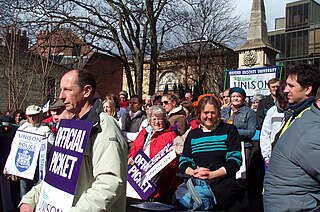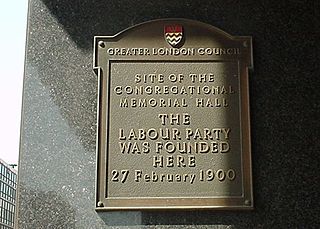Related Research Articles

Thomas Hughes was an English lawyer, judge, politician and author. He is most famous for his novel Tom Brown's School Days (1857), a semi-autobiographical work set at Rugby School, which Hughes had attended. It had a lesser-known sequel, Tom Brown at Oxford (1861).
Emma Anne Paterson was an English feminist and trade unionist.

Trade unions in the United Kingdom were first decriminalised under the recommendation of a Royal Commission in 1867, which agreed that the establishment of the organisations was to the advantage of both employers and employees. Legalised in 1871, the Trade Union Movement sought to reform socio-economic conditions for working men in British industries, and the trade unions' search for this led to the creation of a Labour Representation Committee which effectively formed the basis for today's Labour Party, which still has extensive links with the Trade Union Movement in Britain. Margaret Thatcher's governments weakened the powers of the unions in the 1980s, in particular by making it more difficult to strike legally, and some within the British trades union movement criticised Tony Blair's Labour government for not reversing some of Thatcher's changes. Most British unions are members of the TUC, the Trades Union Congress, or where appropriate, the Scottish Trades Union Congress or the Irish Congress of Trade Unions, which are the country's principal national trade union centres.
James Hayday (1796–1872), was a British bookbinder.
Thomas Joseph Dunning was an English bookbinder and trade unionist.
The Women's Trade Union League, founded in 1874 and known until 1890 as the Women's Protective and Provident League, was a British organisation promoting trade union for women workers. It was established by Emma Paterson, who had seen unions managed by working women in America.

The London Trades Council (1860–1953) was an early labour organisation, uniting London's trade unionists. Its modern successor organisation is the Greater London Association of Trades (Union) Councils

The Labour Representation Committee (LRC) was a pressure group founded in 1900 as an alliance of socialist organisations and trade unions, aimed at increasing representation for labour interests in the Parliament of the United Kingdom. The Labour Party traces its origin to the LRC's foundation.
The Women's Labour League was a pressure organisation, founded in London in 1906, to promote the political representation of women in parliament and local bodies. The idea was first suggested by Mary Macpherson, a linguist and journalist who had connections with the Amalgamated Society of Railway Servants, and was taken up by several notable socialist women, including Margaret MacDonald, Marion Phillips and Margaret Bondfield. The League's inaugural conference was held in Leicester, with representatives of branches in London, Leicester, Preston and Hull. It was affiliated to the Labour Party. Margaret MacDonald acted as the League's president, while both Margaret Bondfield and Marion Phillips served at times as its organising secretary.

Frederick Rogers was an English bookbinder, trades unionist, writer and journalist. He is notable as first chairman of the Labour Representation Committee, the organisation to which the Labour Party traces its origins, as well as for a lifetime of work dedicated to educational improvement for the working class, and to the introduction of a general tax-funded system of old-age pensions.
The National Committee of Organised Labour for Promoting Old Age Pensions for All, often shortened to National Committee of Organised Labour, was a British campaign group established at the end of the nineteenth century which sought the introduction of a general-tax funded old-age pension. The campaign succeeded with the introduction of the Old-Age Pensions Act 1908.

The Printing and Kindred Trades Federation (P&KTF) was a trade union federation in the United Kingdom.
The National Union of Printing and Paper Workers was a trade union representing workers in the printing industry in the United Kingdom.
The National Union of Bookbinders and Machine Rulers was a trade union representing bookbinders and related workers in the United Kingdom.
The Bookbinders and Machine Rulers' Consolidated Union (B&MRCU) was a trade union representing people involved in the manufacturing of books in the United Kingdom.
Henry R. King was a British trade union leader. He was a leading advocate for women's trade unionism who served for many years as treasurer of the London Trades Council.
Edward Ernest Friend, also known as Teddy Friend, was a British trade union leader.
The London Consolidated Lodge of Journeymen Bookbinders was a trade union representing bookbinders based in London.
Robert Banner was a Scottish socialist politician and trade unionist.
References
- 1 2 "Vellum (Account Book) Binders' Trade Society". University of Warwick - University Library.
- 1 2 3 4 Finch, Harold (1992). "Frederick Rogers: Bookbinder and Journalist" (PDF). East London Record. East London History Society (15): 10–14. Retrieved 25 July 2016.
- ↑ "Rogers, Frederick (1846–1915), bookbinder and trade unionist". Oxford Dictionary of National Biography (online ed.). Oxford University Press. doi:10.1093/ref:odnb/37909.(Subscription or UK public library membership required.)
- ↑ Reid, Alistair J. (Jan 2016). "Labour Representation Committee (act. 1900–1906)". Oxford Dictionary of National Biography. Oxford University Press.
- ↑ Rogers, Frederick (1913). Labour, Life and Literature. London: Smith, Elder & Co. p. 63.
- ↑ Bundock, Clement (1959). The Story of the National Union of Printing, Bookbinding and Paper Workers . Oxford: Oxford University Press. p. 52.